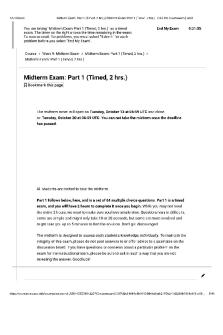1 Malingin v. Sandagan, GR No. 240056, Oct 12, 2020 PDF

| Title | 1 Malingin v. Sandagan, GR No. 240056, Oct 12, 2020 |
|---|---|
| Author | Anonymous User |
| Course | Criminal Procedure |
| Institution | Far Eastern University |
| Pages | 2 |
| File Size | 92.6 KB |
| File Type | |
| Total Downloads | 105 |
| Total Views | 170 |
Summary
Malingin v. Sandagan, GR No. 240056, Oct 12, 2020G. No. 240056, October 12, 2020 DOCTRINE: A petition for MANDAMUS is an appropriate remedy when any tribunal, corporation, board, officer or person: (1) unlawfully neglects the performance of an act which the law specifically enjoins as a duty resulti...
Description
Malingin v. Sandagan, GR No. 240056, Oct 12, 2020 G.R. No. 240056, October 12, 2020 DOCTRINE: A petition for MANDAMUS is an appropriate remedy when any tribunal, corporation, board, officer or person: (1) unlawfully neglects the performance of an act which the law specifically enjoins as a duty resulting from an office, trust, or station; or (2) unlawfully excludes another from the use and enjoyment of a right or office to which such other is entitled. Added to this, it must be shown that there is “no other plain, speedy and adequate remedy in the ordinary course of law” that may be availed of by the aggrieved person. Petitioner Datu Malingin was charged of rape by allegedly having carnal knowledge of a 14-year-old minor. He then filed a motion to quash on the ground of lack of jurisdiction. He argued that since he was a member of the HigaononSugbuanon Tribe, an indigenous group, the criminal case should be first resolved through the customary law and practices in accordance with RA 8371. Respondent judge denied the motion to quash and ruled that RA 8371 only extends to disputes concerning customary law and practices, not those recognized by RPC. Petitioner filed a petition for the issuance of writ of mandamus to compel respondent judge to desist from the criminal case of rape against him. ISSUE: Whether or not the court may issue the writ of mandamus? RULING: No. Under Section 3, Rule 65 of the Rules of Court, a petition for mandamus is an appropriate remedy when any tribunal, corporation, board, officer or person: (1) unlawfully neglects the performance of an act which the law specifically enjoins as a duty resulting from an office, trust, or station; or (2) unlawfully excludes another from the use and enjoyment of a right or office to which such other is entitled. Added to this, it must be shown that there is “no other plain, speedy and adequate remedy in the ordinary course of law” that may be availed of by the aggrieved person. Petitioner failed to show that he has a clear legal right which respondent had violated. To stress, petitioner relied on Sections 65 and 66 (on the jurisdiction of the NCIP), RA 8371 in arguing that respondents have no jurisdiction to prosecute
him for his supposed criminal liability. However, his postulation is untenable because RA 8371 finds application in disputes relating to claims and rights of ICCs/IPs. This is not the case here. Let it be underscored that petitioner’s indictment for Rape has nothing to do with his purported membership in an ICC, but by reason of his alleged acts that is covered by the RPC. At the same time, RA 8371 does not serve as a bar for criminal prosecution because crime is an offense against the society. Thus, penal laws apply to individuals without regard to his or her membership in an ICC....
Similar Free PDFs

Gr.12 - Chemistry Unit 4
- 19 Pages

Gr.12 Data Management Project
- 9 Pages

Carne tec oct dic 2020
- 68 Pages

AFK1501 - Oct-Nov 2020 Answers
- 17 Pages

Enrique v Exes Sec GR 157584
- 2 Pages

GR&RT - Estudio GR&R
- 3 Pages

ASU CSE110 mid term Oct 19 2020
- 46 Pages

Caps fet history gr 10-12 web 1
- 58 Pages
Popular Institutions
- Tinajero National High School - Annex
- Politeknik Caltex Riau
- Yokohama City University
- SGT University
- University of Al-Qadisiyah
- Divine Word College of Vigan
- Techniek College Rotterdam
- Universidade de Santiago
- Universiti Teknologi MARA Cawangan Johor Kampus Pasir Gudang
- Poltekkes Kemenkes Yogyakarta
- Baguio City National High School
- Colegio san marcos
- preparatoria uno
- Centro de Bachillerato Tecnológico Industrial y de Servicios No. 107
- Dalian Maritime University
- Quang Trung Secondary School
- Colegio Tecnológico en Informática
- Corporación Regional de Educación Superior
- Grupo CEDVA
- Dar Al Uloom University
- Centro de Estudios Preuniversitarios de la Universidad Nacional de Ingeniería
- 上智大学
- Aakash International School, Nuna Majara
- San Felipe Neri Catholic School
- Kang Chiao International School - New Taipei City
- Misamis Occidental National High School
- Institución Educativa Escuela Normal Juan Ladrilleros
- Kolehiyo ng Pantukan
- Batanes State College
- Instituto Continental
- Sekolah Menengah Kejuruan Kesehatan Kaltara (Tarakan)
- Colegio de La Inmaculada Concepcion - Cebu







